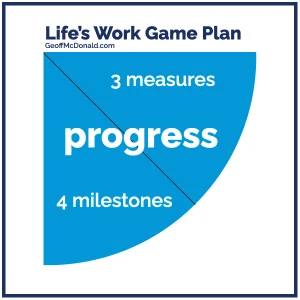Your life’s work won’t just happen automagically by itself.
To fulfil your life’s work you need a plan. But what’s the best way to do this?
The Four Principles of Every Game
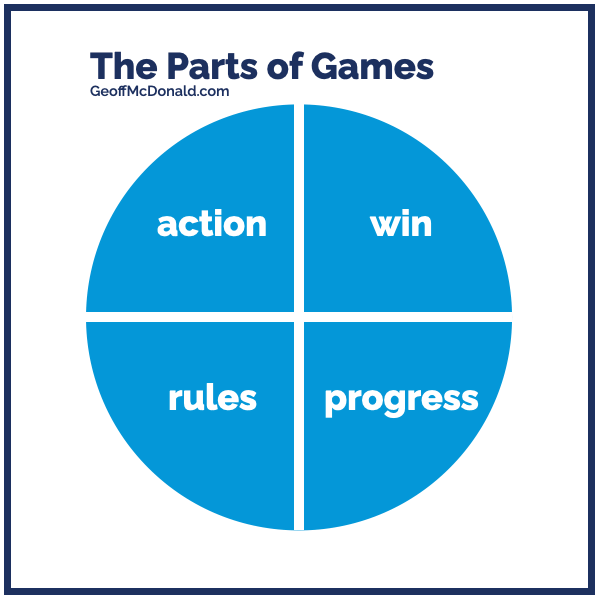
Games may be simple, like hopscotch or Rock, Paper, Scissors. They may be more complex like Chess or Go. They may be part of billion-dollar industries like the Olympics, the AFL or the NBA. Or they may be multi-million-dollar video games like Clash of Clans or Helldivers.
Every game has four common elements. And you can use these principles to design any project – including your life’s work. The big advantage of designing your life as a game rather than a project is that you can include the specific behaviours you want to take. (Projects usually only list the actions to complete, but not the rules of how you play.)
To design your Life’s Work using a Game Plan, each of the four main elements has two parts. Plus there is one bonus element. That makes nine things or nine questions you need to answer.
Are you ready to plan your life’s work? Let’s play.
WIN
If you don’t know how to win your game, then how would you know what action to take? There are two steps here.
1 Intention: What is your Life’s Work?
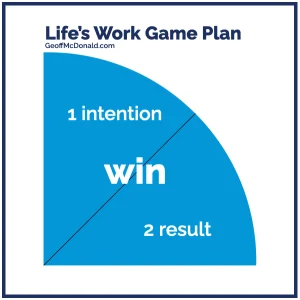
- Being a great Mum or Dad,
- A leader in your community
- Creating something specific
- Ticking off your bucket list
- To be the best person you can be
- Or the hobby you devote yourself in your spare time?
I’m an ideas guy and my life’s work is all about what I create. I found that usually my ideas are shared to people in coaching conversations or in meetings. But unless they are implemented they are lost. They vanish and I have nothing to point to of what I contributed. That’s why I write books, blog posts, videos and art. These are the artifacts or results of my thinking. And I can point to them and say, ‘That’s my life’s work’.
2 Results: What specific and measurable result will you produce?
Your intention gives you a general direction to follow. But unless you get specific about the result you’re producing, you’ll never know if you’ve achieved it.
Imagine running a marathon and not knowing where the finish line is. You wouldn’t know whether to stop running or keep running. Plus, you’d never be able to claim that you ran a marathon because you’ll have no evidence to prove it.
I’ve defined my Life’s Work as writing 25 books. How did I come up with that number? I made it up. I could have chosen one, ten or one hundred. But since I’ve already written 12 books I thought if I could double that would be a good result. As I shared in this post, I already have 8 half-written books to finish so 25 sounded about right.
To define your Life’s Work, you’ll need to do the same: find some way to measure it. Here are three examples;
- A great parent – you’ll need to define what that means to you and how that might look in practice. For instance, it could be to spend 1000 meaningful moments with your daughter or 30 quality minutes a day with your son.
- To be a thought leader in your area of expertise – part of my Life’s Work is to attract one million views on YouTube. To achieve this I have to create a body of work (videos) of sufficient quality and value to attract an audience.
- A leader in your community – actively take on leadership roles in community organisations for more than 20 years.
Remember, to measure something you need to be able to count it, which means you need to quantify it in some way.
PROGRESS
The worst thing you want to do around your life’s work is to spend time defining it and then lose your motivation for taking action and fulfilling it.
The key to motivation is a sense of progress. On any task, when you feel like you’re getting somewhere you’re more likely to stick at it for longer.
Give your Life’s Work will take you 30, 40, 50 or more years to fulfil, this is vital.
To do this you need two things.
3 Measures: How will you measure your results along the way?
First, you need
to measure your results. The key here is how you define your result in the previous section.
I defined my results as writing 25 books. This makes it easy to measure. All I have to do is ask myself: How many books have you written?
If you’re unsure what to measure, revisit your result and look for ways to quantify it.
As with the parenting example, this is not an easy thing to measure because quality often trumps quantity. Watching a football game with your son may be good, but having a kick of the football at the park might be better. In this case, you might count the minutes you spend together but you may also rate the quality of this time. It might seem strange to be counting such things but this is one way to bring your attention to the important things in your life.
Here are some other examples:
- A CEO may count the rise in profit during their tenure or the improvement in engagement levels at work as their Life’s Work.
- A home cook could count the number of awards they win in competitions or how many birthday cakes they give away to friends and family.
- Speakers or trainers can count the number of events they’ve spoken to and the number of people in their audiences. “I want to present to 10,000 people”.
4 Milestones: What results will you produce along the way? When?
A milestone is a stone marker along a road that tells you how many miles to the next town.
Once you’ve defined how to measure your progress, put some dates alongside them to create some milestones.
For instance, I could write one book a year. That’s a specific result every year.
RULES
Next, every game has rules. While it can be hard to follow someone else’s rules, it can be a lot of fun create your own. There are two types of rules to create.
5 Boundary Rules: What’s included and not included in your game?
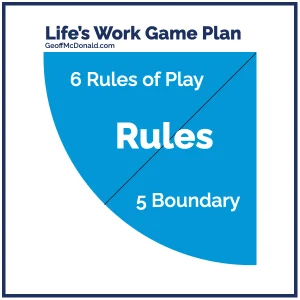
For example, if you were hosting a party for your 16-year-old daughter you might decide it must end at midnight and a maximum of 50 people can attend.
An obvious boundary is when your game finishes. How long are you going to play your Life’s Work game?
- As a parent, this might be a lifelong commitment.
- As a triathlete, you might retire when you feel yourself getting too old to perform as well as you’d like to.
- If your Life’s Work is your career, you might retire at 65 and say ‘I’m done’.
Boundary Rules also define what is not included in your game.
For instance, in writing books, I could employ a ghostwriter to write them for me. But I don’t want to do that. Therefore, a boundary rule for me is ‘No ghostwriters’. That’s a line I’m not going to cross.
6 Rules of Play: What actions are acceptable? What are they not?
Once you’ve defined the arena to play in, you must decide what actions to take.
For the birthday party of your 16-year-old daughter, you might decide that smoking is okay but alcohol is not.
I’ve decided that I can only AI for research for my book-writing game. Plus, from what AI provides, I must rewrite it in my own words. In other words, no copying and pasting direct slabs of text into my book. If you were writing a book you might do this differently, but this is how I have chosen to play.
And that’s an important point – these are my rules for my game and my life. You can make up your own rules because it’s your game and your life.
NOTE: Boundary Rules determine the area you’re going to play within. Rules of Play determine how you will play in that area.
ACTION
Usain Bolt was the fastest man on the planet. He could run 100 metres in 10 seconds. At his peak, he competed in 2-3 races per week and up to one minute per week. That’s it – one minute. But he also spent a further 20 or more hours preparing to run fast.
This is how you want to think about your game plan actions.
7 On-Field Actions: What actions must you take to complete your game?
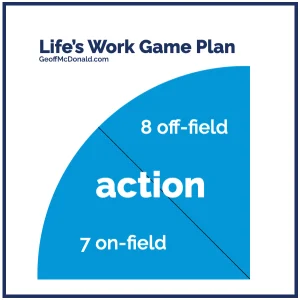
In writing books, the crucial action I must take is to write.
But other crucial actions are less direct. For instance:
- Read and research my ideas.
- Gain feedback and discuss my book with colleagues.
- Edit my book so it is easy to read.
- Design the book so it can be published.
What are the critical actions you must take to fulfil your Life’s Work?
8 Off-Field Actions: What actions must you take to help you be at your best?
Your Off-Field Actions are the ones that you need to take to be able to fulfil your On-Field Actions.
If I’m going to wake up every morning at 7 am to write my book for two hours then I’m going to need a good night’s sleep.
For Usain Bolt, this would have included:
- Eating well
- Stretching
- Massage
- Gym sessions
- Training
- Sleeping well
- Rest and Recovery
- Take time out
What do you need to do to be at your best? And you might add some things you won’t do. For instance, how many glasses of wine or cups of coffee is too much?
BONUS
9 Name: What is a sexy and inspiring name for your game?
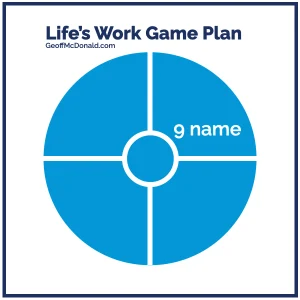
You could call it ‘Bob’. But, that’s probably not going to inspire you. Unless of course, your name is Bob.
It might be as simple and as obvious as ‘My Life’s Work’. If it truly is your life’s work then that will be stacked with meaning and inspiration. That’s what I’ve called my book-writing projects.
Or you might come up with something more specific. For example:
- World’s Greatest Dad
- Masterchef
- I chose ‘Picasso’ for my art project because he’s one of my heroes
- Sunflower – because you want to be a beacon of hope and light to others
- Lighthouse – to guide others in your coaching business
Have some fun with this!
More Examples of Creating Your Game Plan
Here are several other examples of using this Game Plan template to define your important work.
- The best project planning template for thought leadership content
- The best project planning example for content creation
More on Creating Your Life’s Work
This is Part 4 in an ongoing series on your Life’s Work. Here are some links to the previous parts:

